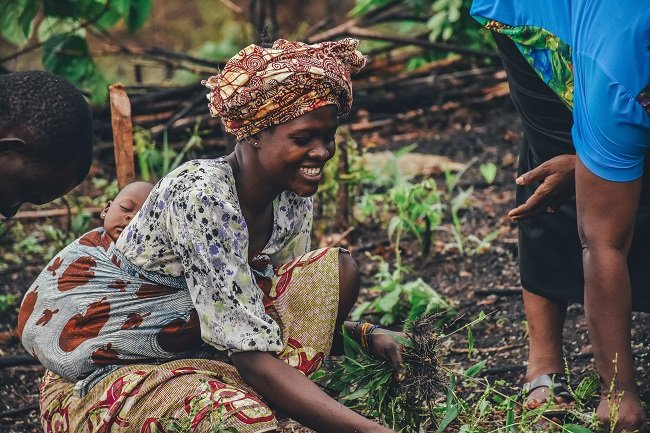
| FAO knowledge exchange on extending social protection to rural households |
| ACCRA, Ghana, We must not programme for farmers, but with farmers – this message was echoed by panelists and speakers throughout FAO’s recent Regional Knowledge Exchange webinar, Exploring the role of producer organizations in the extension of social protection to rural households (15 December 2021). The webinar was organized as part of a collaborative project between FAO and the African Union Commission (AUC), to spur innovative approaches to increase social protection coverage of informal rural workers, in support of the AUC’s Social Protection Plan for Informal Economy and Rural Workers (SPIREWORK). The aim of the webinar was to share emerging good practices on working with producer organizations to expand social protection to reduce vulnerability, especially considering the deepening economic and food crises that are unfolding as a result of or compounded by the COVID-19 pandemic. The event facilitated an exchange of experiences among African countries, and encouraged broader South-South exchange by sharing innovations from China. “We hope this exchange on good practices will influence other African countries to work with rural organizations and adopt more innovative approaches to increasing social protection coverage for rural informal workers,” said Yurdi Yasmi, FAO Deputy Regional Representative for Africa. The potential of rural organizations Rural organizations have a key role to play in expanding social protection coverage in rural areas, as their membership are often among the most vulnerable in Africa – poverty and hunger are concentrated in rural areas, where livelihoods, incomes, and food security depend heavily on agriculture. Notably, 82% of the poor live in rural areas, earning their living primarily in agriculture. Rural organizations can contribute in multiple ways to improving access to social protection systems for their membership, from providing a platform for information sharing, to supporting ‘last-mile’ implementation by facilitating enrollment, payment of social insurance contributions, and data collection from members for enhanced evidence generation on social protection. Representatives from programmes in Côte d’Ivoire, Senegal, Tanzania and China presented cases of producer organizations engaging with their respective governments to improve social protection delivery. Sabelo Mbokazi, Head of the Labour Employment & Migration Division under the Health, Humanitarian Affairs and Social Development Department of the AUC, called on the panelists and participants to increase efforts “…to capture timely and accurate social protection data to ensure better informed and targeted development policy.” The case of Côte d’Ivoire highlighted how building capacity in social protection, increasing formalization of cooperative structures, and providing a digital platform to manage cooperative activities can build trust and confidence between cooperatives and members. This, in turn, sets the stage for equipping cooperatives to facilitate access to formal social protection, providing members with information on benefits and eligibility, supporting enrollment, and collecting routine fees for national health insurance schemes and social security programmes. Towards SDG1: Ending Poverty The Senegal case demonstrated the importance of understanding social protection needs and coverage, particularly for marginalized agricultural subsectors, such as fisher folk. Before embarking on expanding and improving adequacy of coverage, it is necessary to understand the current state of coverage, in particular for vulnerable groups. Mandela Adajagsa of the Ghana Federation of Forest and Farm Producers (GhaFFaP) noted the criticality of undertaking studies to provide evidence, highlighting the need to better understand how COVID-19 has affected producers and their resulting social protection needs, in order to make evidence-based policy decisions. Tanzania’s Participatory Plantation Forestry Programme (PFP2) is an example of an attempt to link social assistance programmes with further productive support for the most vulnerable in forest communities. In observing this good practice, Godfrey Wanyama of the Farm Forestry Smallholders Producer Association of Kenya (FFSPAK) commented that we must look beyond the immediate social assistance responses and offer comprehensive programmes to ensure livelihoods are protected and supported as well. The case of China showed the potential for community-based organizations to engage in organized economic activities, and use the profits for the collective good of the community. The rural collective economy provides structured informal social protection benefits to community members, while also engaging directly with local government to subsidize members’ contribution to national social security programmes as well as social protection benefits from the national health insurance programme. As noted by Benito Eliasi, Programme Officer, Southern African Confederation of Agricultural Unions (SACAU), China’s case shows the need for producer organizations to have a clear understanding of social protection programme benefits and eligibility and be given clear roles and responsibilities for the engagement of their membership in order to successfully support in improving delivery of social protection to their members. The global network Women in Informal Employment: Globalizing and Organizing (WIEGO) provided a video statement calling on governments to provide higher levels of protection and social insurance schemes that meet the needs of informal workers, citing a need for co-creation of programmes alongside rural organizations to ensure they are fit for purpose and meet the realities of constraints and opportunities on the ground. The webinar is a first step for FAO Africa in spreading good practices in engaging producer organizations for improved coverage for social protection, and FAO called on government counterparts, development partners, and rural organizations to increase collaboration and sharing of experiences to ensure social protection for all, as indicated in Sustainable Development Goal 1.3. |
